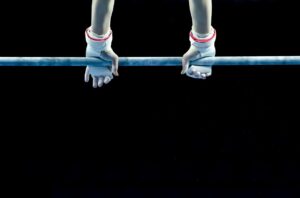This will not be on the test.
I told my students the Wednesday posts would be “less formal”, which is a nod toward our school’s practice of “Formal Wednesday’s” where we often have assemblies, always have higher stipulations for the dress code, etc. In thinking how to set this up, I wanted symmetry and consistency, so the solution is to post every weekday and give a quiz every Tuesday/Thursday, but Wednesday is the odd day out. I’ll pick up The CARES Act, part 2, tomorrow.
My first semester at Hillsdale College, I walked onto the track & field team. I practiced with the team daily for several months, and I could write at length about this experience, but my focus today is on my decision to walk off the team. I was completely out of my element; for example, I was trying to be a sprinter but had never used blocks or done weighted squats. I was quite literally years away from being able to contribute to the team in meets, if ever. It was tortuous in many ways, including making me face insecurities I didn’t know I had. It was also good for me and certainly a factor in my belief we should venture outside our comfort zones intentionally and regularly, if we are serious about personal growth.
I was getting faster and stronger, I liked my coaches and teammates (but I was too stuck in my own head to befriend them during that stretch, which I regret), and I actually was starting to like the role of pushing the “starters” at practice and setting goals that were years of hard work away. I was even getting free shoes! Then I quit. Why?
I went on Thanksgiving Break.
We didn’t have the full week off from classes, but some friends and I concocted a plan to skip a few days of classes and go on a week-long road trip, celebrating Thanksgiving in multiple states with each other’s families (this was possible because my family, traditionally, does not celebrate Thanksgiving on Thanksgiving, because my dad spent most major holidays working in the emergency room).
When I talked to my track coach about this plan, he was not on board. He told me in as clear terms as possible that I shouldn’t miss practice, without actually forbidding me. I still feel bad about this conversation, because he said all the right things, and I didn’t listen. Now, I appreciate that he took it so seriously and treated me like he would treat any other member of the team, although he didn’t have the leverage (scholarships, “playing time”) that he may have used to enforce team standards for any other member of the team, and I clearly wasn’t vital to team success at that point. I assured him I would find a track and do the workouts on my own, and I was totally committed to the team. I believed both of these things 100% when I said them.
I did find tracks, and I did do the workouts, but when I got back to campus, I told the coach I was done with the track and field team. In a week, my thinking had changed completely. This decision is a huge “what if” in my life trajectory, but that’s beside the point.
This sort of thing happens all the time. A conversation, a cultural event, even a coincidence, can make us see things from a new perspective, alter our incentives, and ultimately change our minds. In my case, it was a mix of factors. A big part of it was breaking from the “this is the way we’ve always done it” approach I had already developed to practicing every day. I was in the thick of it, spending several hours a day stretching, sprinting, weight lifting, ice bathing, shin splint icing, chocolate milk drinking, and once I committed, I didn’t question it. Being out of the routine, away from the people with shared mentalities, forced me to look at the decisions I was making from a new angle. Another aspect was realizing how much I enjoyed the freedom to go on a road trip with my friends whenever I wanted, and I could only realize that by doing it. My ultimate conclusion was something like this: I do enjoy the challenge and I value being part of a team, but I don’t love track enough (and I’m not good enough at it) to have it define my time in college. I can find other ways to challenge myself with less of a time commitment and more flexibility. Again, my exact thoughts are beside the point, but I do think I made the right decision.
So, what is the exact point? And what does this have to do with forest fires?
Our ongoing economic and social shutdown is going to be difficult. Bad things are going to happen to us and/or people we care about, whether it’s missed graduations, canceled trips, lost income, unemployment, sickness, death, or plain old boredom and loneliness, and we’re going to have to deal with those things as they come. Yes, this pandemic is beyond a once-in-a-lifetime, once-in-a-generation-type disaster, and it’s going to get worse before it gets better, but it’s not all bad.
I’m not making some cutesy “family time!” or “reprioritize your own life!” point, although I don’t disagree with those approaches, necessarily. I’m thinking way bigger. This shutdown would never, could never, happen except in disastrous circumstances. It cannot be simulated, and the real “seen” costs are far too large to ever justify some vague potential “unseen” benefit of shutting down society just to see what happens. Therefore, it’s giving us the opportunity to step off the hamster wheel, look under the hood, and evaluate how everything works in a way that simply isn’t possible any other way.
In many of the conversations I had about “remote learning” or extended spring breaks before it became reality, people expressed concern with making up school days in the summer. That was their focus. They didn’t seem to understand that the entire concept of “required” school days per year or hours of “learning” is made up and therefore subject to change. I try to drive this awareness (rules matter! we need good rules! we need good people making the rules!) home in Economics, and this year I even asked my classes to reconsider how many days we have in a week. Is there a better way to group weekdays and weekends? This is a paradigm we don’t typically question, and it’s impossible to imagine it changing, but that doesn’t mean it’s the best option.
We should view this shutdown as an opportunity to get perspective on structural aspects of our society. What are we doing because we’ve always done it that way? What doesn’t make sense anymore? Things that were impossible to imagine changing have changed, and they may never go back to the way they were.
I’m loving seeing the breakdown of artificial barriers to entry, like our government waiving or reducing restrictions against doctors and nurses practicing across state lines. The TSA is allowing 12 oz. bottles of hand sanitizer in carry ons! Yes, that meeting could have been an email. Turns out lots of work CAN be done from home if that’s the only option, which is going to have fascinating implications, especially considering the average commute time in the United States is 27 minutes and studies repeatedly show your commute has a high correlation with your actual happiness.
I have strong feelings about education being better in person, but it can’t be a bad thing that our nation’s teachers are going to be a whole lot more tech-savvy after this is over.
And so on and so forth. At the very least, anything is possible.
We tend to view forest fires as a threat and something to avoid at all costs, and it’s only recently that we’ve figured out that trying to prevent all fires actually makes the fires worse when they do get out of control, because of the buildup of dead branches and foliage on the floor of the forest. Fires appear to destroy environments in the short run, but in the long run you need a fire every once in a while to ensure a healthy habitat. This virus is out of control and will cause a lot of damage, but it’s also clearing a path for new growth.
[Disclaimer: I’m aware the “silver linings” nature of this post could change over time depending on how things progress; for example, if I get sick and die. Nevertheless, that won’t mean it’s not true.]


